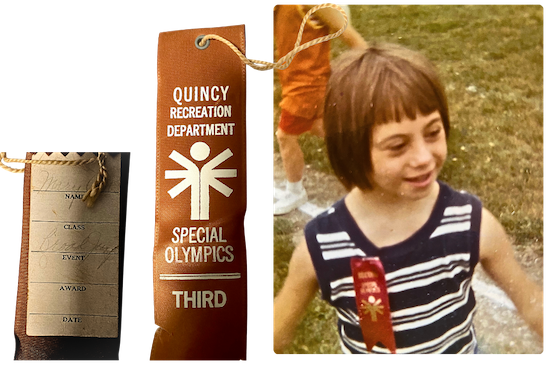The last 25 meters stood between Amos Njenga and the finish line of the 100-meter freestyle during the 2025 Special Olympics MA Summer Games at Harvard University’s Blodgett Pool. He had made it nearly the entire length of the pool, but at the far wall… he stopped. Amos just hung out there, hands on the edge, taking in the scene. Meanwhile, the other swimmers were already finished and waiting. His coach, Paul Johnson of the Tri-Y Seals, was waving him on, calling out, “Go, Amos! Swim! You’re not done yet!”
But he held on.
So, what happened next? For anyone who has ever been to a Special Olympics event before, it’s no surprise that the entire community came together. First it was his coach, then event staff, then other coaches, then fans in the bleachers. One by one, the whole place started cheering. Everyone wanted to see Amos finish. They didn’t know Amos personally; but chances are they knew someone like him. They got him, they understood him. They knew what this moment meant. And when he finally pushed off the wall, the whole place ERUPTED. The entire pool deck exploded with cheers, like he was the anchor for a relay at the Olympics.
Coach Paul, who has worked with him for over 12 years, explained how it all began.
“He didn’t swim when he first started. It was a challenge to get him in the pool, to get him focused, to stay consistent, to stay on his front, to stay on his back,” he said. “At times he would get distracted, so we were consistently having him work on just focusing on what he needed to do in that moment.”

Amos’ journey in the pool didn’t start with strokes or kicks. It started with trust. “He went three years without getting in,” his mom, Mary Njenga shared. “Then he started going inside with the coach for a very long time. Then he went in and started walking. Then he floated by himself, and now he can do it by himself. It was quite a journey. He has come a long way.”
.jpg)
And it’s not just his skills in the pool that have grown. His dad, James Kamiti, pointed out how much more confident Amos has become socially. “He has grown a lot with Special Olympics and he really loves it. He sleeps over in the dorms at night and he loves the weekend,” he said. “He has come a long way. Even interacting with so many people, I can’t believe he can go and meet thousands of other people—before he would have a phobia with this. Special Olympics has helped with these social behaviors.”
For Coach Paul, watching the entire pool deck cheer for Amos was a full-circle moment.
“It’s why I do this,” he said, eyes tearing up. “He’s come so far from where he started. I’ve always known he could do it, and now everyone else knows too.”
In that moment, when Amos let go of the wall, it wasn’t just about finishing a race. It was about everything that came before it—years of hesitation, of breakthroughs, of courage.
So no, Amos didn’t win the race.
But honestly? He kinda stole the show.



.png)

.png)
.png)



%20logo%20sm.svg)
